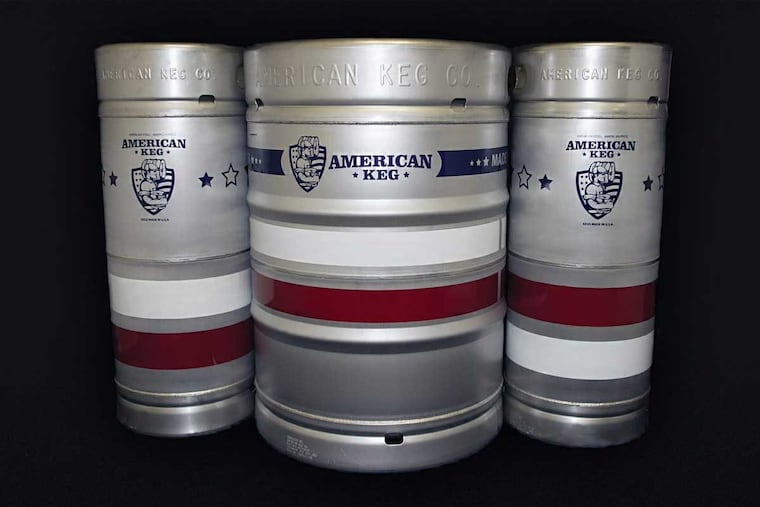David vs. Goliath: Pottstown’s American Keg fights Budweiser over imported beer kegs
A trade case may lead U.S. officials to protect one small Pennsylvania company over the objections of Budweiser.

Here’s a brewing trade spat: Budweiser, “the King of Beers,” comes in Chinese-made kegs.
That’s what American Keg Co. of Pottstown, the only U.S. company still making stainless steel beer kegs, discovered after it filed antidumping complaints against Chinese, German, and Mexican keg makers last year.
The U.S. Commerce Department recently found merit in American Keg’s claims of unfair trade practices, and now the government is poised to slap harsh duty penalties on hundreds of thousands of foreign-made kegs in early December. It’s one of about 185 dumping cases undertaken by the Trump administration that have targeted the huge Chinese trade deficit as bad for the U.S. economy.
St. Louis-based Anheuser-Busch LLC opposes the penalties on imports from the three countries and warned last week of foamier beer prices. Trade experts say Chinese kegs could more than double in price. German keg-maker Blefa also opposes the duties.
But around Philadelphia, some craft brewers are pulling for 32-employee American Keg.
“I hope they make it,” said Brian O’Reilly, a brew master and partner at Mainstay Independent Brewing on Delaware Avenue. “They are a Pennsylvania company, and we are a Pennsylvania company.”
O’Reilly added that “it’s important to have someone in the United States making kegs. We could certainly import them, but we could say that about everything.”
O’Reilly recalled a period about 15 years ago when beer-keg supplies ran out for craft brewers. American Keg launched its keg-manufacturing business in Pottstown around 2016 after buying the assets of a former keg importer.
In mid-October, Commerce Department investigators released their findings that the Chinese government subsidized domestic keg manufacturers and dumped their kegs into the U.S. market while German firms only dumped kegs at low prices. The agency first ruled on the Mexican kegs over the summer, saying they were dumped, too.
More than 15 Chinese companies failed to respond to the U.S. trade probe, according to the Commerce Department. Federal investigators determined that subsidized Chinese keg makers could be penalized with offsetting duties of 16% to 145%. An offsetting duty of 145% would more than double the price of Chinese kegs.
Penglai Jinfu Stainless Steel Products, one of the Chinese companies that did not respond, was an Anheuser-Busch supplier and appears to be owned by the Gansu provincial government in China, according to websites and trade documents.
Some Chinese keg makers could abandon the U.S. market, experts say. The penalties also could enable American Keg to boost its prices and profits. The most popular kegs are one-sixth kegs for about $75, while one-half kegs go for $115, according to brewers.
The quasi-judicial U.S. International Trade Commission is scheduled to consider financial penalties and issue a decision on Dec. 2, according to the Commerce Department.
Experts were surprised that a small Pennsylvania company can torpedo international supply chains for beer.
“Wow,” said Marc L. Busch, professor of international business diplomacy at Georgetown University, referring to the potential penalty on Chinese kegs. (He is no relation to the Buschs who owned Anheuser-Busch.)
As for the company’s buying kegs from overseas firms, Busch said, “It’s hardly novel. You find that a lot of U.S. companies have supply chains that are more linked backward to foreign firms than to American firms.”
John Donohue, an international trade lawyer with the Philadelphia firm Ciardi Ciardi & Astin, said “a lot of companies would just go after the Chinese. But [American Keg] went after all three, Mexico, Germany, and China.”
American Keg is showing that complex laws designed to prevent international monopolies in auto and steel companies, "can also be used by little guys with a single manufacturing facility in a small Pennsylvania city,” Donohue said.
American Keg chief executive Paul Czachor declined to comment.
An Anheuser-Busch spokesman said last week that the St. Louis company "remains a dedicated and proud contributor to the U.S. economy. Less than a handful of keg producers around the world can meet the company’s capacity, quality, and timeliness requirements, and currently there is no producer in the United States that meets these criteria. Thus, for Anheuser-Busch and many other similar brewers in the United States, the only result of these duties will be increased cost of beer.”
Anheuser-Busch and keg importers say that American Keg can’t satisfy the high volume of quality kegs needed to sate the nation’s beer thirst. American Keg also misjudged the U.S. craft brewery market, they say. Craft breweries, now in many American towns and cities, have tended to lease barrels from big keg-leasing companies instead of buying them from American Keg.
Shara L. Aranoff, an Anheuser-Busch attorney and former chair of the U.S. International Trade Commission, told trade officials, based on documents, that “there has been a significant shift away from the small craft brewer segment on which [American Keg] focuses, and toward a channel of distribution where [American Keg] does not meaningfully compete: leasing/rental companies, which offer craft brewers innovative keg management services that [American Keg] does not and cannot provide.”
Jason E. Kearns is a Penn Law graduate whom Trump appointed to the U.S. International Trade Commission in June 2017. “This is sort of the elephant in the room,” Kearns is quoted in documents about whether American Keg had enough manufacturing capacity to satisfy big orders. "Maybe it would be better to call it the Clydesdale horse in the room.”
As for American Keg, it seeks a hoppy ending.